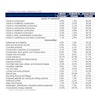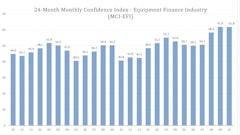
Many of us do business today or want to do business tomorrow, with our state and local governments—cities, counties, schools, higher education, hospitals, airports, Departments of Transportation, and more. Equipment rental companies often provide short-term rentals that can look like “try before you buy”; direct new equipment sales from our OEM readers; and, used equipment sales from rental fleets. A key to winning this business is to offer a financing option that conforms to the procurement laws in all 50 states—that option is called tax-exempt lease purchase, (TELP or “Muni Lease”).
What is the TELP?
Simply put, the TELP is a form of financing that all governments use when they need to finance a purchase that’s not in their current budget—whether that budget is cash on hand or bond dollars. Over 30% of all equipment purchased by this audience is financed in this way, representing a market over $10 billion annually. This market includes not only the 50 states and their agencies, but according to the most recent 2022 Census of Governments, the Census Bureau counted 90,837 governments in the U.S. In addition to the federal government, the 50 state governments, and the government of Washington, D.C., there were 3,031 county governments, 35,705 township and municipal governments, 12,546 independent school districts and 39,555 other special-purpose local governments.
This is too big a market not to add to your toolbox!
State and local governments have three ways to purchase equipment from you: cash on hand (something that’s always in limited supply); bond dollars that are generally already specifically allocated to projects the voters approved; and, TELP or the “muni lease.” The key feature of a Municipal Lease is the annual appropriation clause. The annual appropriation clause complies with a government that cannot bind its citizens to an obligation beyond that single year’s approved budget or bonds. For example, Saulsbury allows them to terminate the contract without penalty if they are unable to budget funds for future year’s payments. The only recourse a municipal lessor has is to recover the equipment or rewrite the financing to something they can afford.
While on its face this sounds like quite a risk, Saulsbruy focuses on “essential use” equipment—exactly what you rent and sell—and our trade association reports less than 1/2 of 1% of all muni leases invoked non-appropriation. Candidly, that’s not bad when over 1.2% of all car loans today are charged off.
In exchange for this privilege, the IRS grants an exemption from having to pay tax on the interest a municipal lessor earns—like the municipal bonds in your investment accounts. This then allows interest rates to be very low. In today’s market that’s often below 5% and in the case of renewable energy, such as solar or storage, it can even be below 3% fixed for the full term for that solar and storage generator profiled in a previous issue of Rental. And, unlike your automobile lease, these are lease in name only. Each customer should be provided with an amortization schedule allowing them to pay early and enjoy a $1 purchase option at the end of term. Since the business of financing governments is a highly regulated business 100% transparency is required with not only amortization included in their documents, but an IRS form is filed disclosing all rates and fees. This transparency assures rental companies of continuing trust and loyalty from government customers and winning more business in the years ahead.
New and used equipment can be financed in this way; 100% financing is the norm. Payments can also be sculpted or adjusted for seasonality, such as the school district that wants to skip payments in the summer for that stand-by generator or the airport that wants to have zero payments for the snow plow in the summer months. For you, this is a 100% non-recourse cash sale.
Know Your Provider
The financial service industry is well represented across the country with independent lessors and banks leading the charge. You’ll find the service from many trade association members to be first class with real-time quotes available for your opportunities such as construction financing or “progress payments” for long lead time items and more tools designed to win new forms of business for you and your company. The process can be very straightforward starting with your TELP partner providing you with a quote of payment options for your proposed sale. This can be fine-tuned with your customer and by sharing it with your contact (often someone in operations vs. finance) will accelerate your sale since they often take the quote to finance or purchasing showing they have both a cash and finance option.
This quote will typically include a reference to the applicable state statute so your customer has confidence this is a tool that will work for them.
The key issues are:
- Customer Type: Confirming they are a government is something a TELP provider can do from a variety of sources
- Customer Credit: Providers should subscribe to a wide range of data sources to allow them to approve a transaction on an initial call
- Equipment: The TELP provider confirms it is “essential use” and the useful life of new or used equipment (at least, as long as the lease is with the same provider). Stable vendors and brands are important, a provider should know that parts and services will be available for the long haul
We are all looking for new channels for our businesses and new ways to serve our customers. I hope this information helps you win more business today and for many years to come.





















